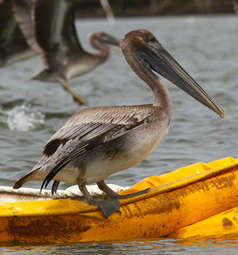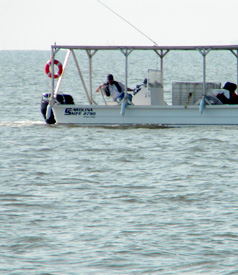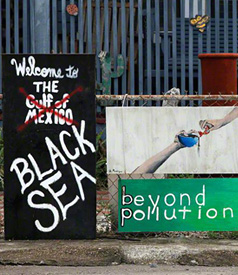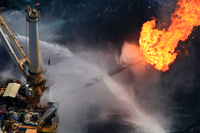by Dahr Jamail
October 4th, 2010 | T r u t h o u t

(Photo: Erika Blumenfeld)
In August, Truthout conducted soil and water sampling in Pass Christian Harbor, Mississippi; on Grand Isle, Louisiana; and around barrier islands off the coast of Louisiana, in order to test for the presence of oil from BP’s Macondo Well.
Laboratory test results from the samples taken in these areas show extremely high concentrations of oil in both the soil and water.
These results contradict consistent claims made by the federal government and BP since early August that much of the Gulf of Mexico is now free of oil and safe for fishing and recreational use.
The samples taken were tested in a private laboratory via gas chromatography.
The environmental analyst who worked with this writer did so on condition of anonymity and performed a micro extraction that tests for total petroleum hydrocarbons (TPH). The lower reporting limit the analyst is able to detect from a solid sample is 50 parts per million (ppm). [Read more →]
Blog entry posted by Dahr Jamail, October 3rd, 2010

Dear Readers:
I have been covering the BP Oil Disaster in the Gulf of Mexico for several months now, and together with my partner, Erika Blumenfeld, we have brought you stories and photographs that document and archive the human and environmental impact of the historic and horrific disaster that is the BP oil catastrophe.
Despite the ongoing attempts by both BP and the Federal Government to convince people that the disaster is over, the reality is that it has just begun. Recent weeks have seen ongoing massive fish kills, fresh oil washing ashore, and increasing reports of human illness likely due to BP’s heavy use of the toxic dispersants across much of the Gulf Coast.
We are now heading back to the Gulf Coast for our third trip, and will be reporting from there for three weeks in order to document and investigate the current state of the crisis, and continue interviews with the environmental philosophers, activists, scientists, sociologists, riverkeepers, bayoukeepers, indigenous tribes, and fisher people we have been following these last months.
The complexity and breadth of this continued crisis is beyond what we could have imagined. Currently, the media coverage in the wake of the BP disaster has gone almost silent, and so independent reporting on the Gulf Coast is even more essential and timely.
As a freelance team, we could not have produced this important work without your generous support. We are deeply grateful to those who were able to contribute to our efforts thus far.
With so much of our investigation requiring that we be out in the field, I am humbly appealing for your continued support to help us return to the Gulf, so that we may continue to bring you the unfolding events of this devastating issue that clearly effects us all.
Please support our work in the Gulf Coast by making a donation. There are several ways you can donate:
If you would like to make a tax-deductible donation, International Media Project (IMP) is providing fiscal sponsorship to Dahr Jamail.
Checks for tax-deductible donations should be made out to “International Media Project.” please write “Dahr Jamail” in the memo line and mail to:
International Media Project/Dahr Jamail
1714 Franklin St.
#100-251
Oakland, CA 94612
Online, you can use Paypal to donate HERE.
Donations can also be mailed to:
Dahr Jamail
P.O. Box 970
Marfa, TX 79843
Direct links to our pieces produced thus far, thanks to your support:
Direct link to Erika Blumenfeld’s photographs from our reporting on the Gulf Coast oil catastrophe:
Gulf Coast Photo Gallery
by Abdu Rahman and Dahr Jamail
September 21st, 2010 | Inter Press Service
BAGHDAD - Iraqis promised development with the ouster of Saddam Hussein and the arrival of the U.S. are now suffering lack of development as never before. And where it hurts every moment is through the collapse of power supply.
More than seven years into the U.S. occupation, most Iraqis lack electricity, leading to demonstrations in towns and cities across the country.
“The big problems began in 2003 with the occupation of Iraq,” 61-year-old Hashim Mahdi told IPS in Baghdad. “The occupiers destroyed all the institutions and the country’s infrastructure, including power plants. More than seven years later there is no improvement.”
Like other Iraqis, Mahdi agreed there had been infrastructure problems before the U.S. occupation, due to Iraq’s war with Iran, and then the U.S. bombing campaigns throughout the 1990s that targeted power plants. But after those attacks, the former regime was able to get the electricity supply restored.
The problems since 2003 have been far worse.
[Read more →]
by Dahr Jamail
September 13th, 2010 | T r u t h o u t

Private contractor in Carolina Skiff with tank of Corexit dispersant, August 10, south of Pass Christian Harbor, 9:30 AM. (Photo: Don Tillman)
Shirley and Don Tillman, residents of Pass Christian, Mississippi, have owned shrimp boats, an oyster boat and many pleasure boats. They spent much time on the Gulf of Mexico before working in BP’s Vessels Of Opportunity (VOO) program looking for and trying to clean up oil.
Don decided to work in the VOO program in order to assist his brother, who was unable to do so due to health problems. Thus, Don worked on the boat and Shirley decided to join him as a deckhand most of the days.
“We love the Gulf, our life is here and so when this oil disaster happened, we wanted to do what we could to help clean it up,” Shirley explained to Truthout.
However, not long after they began working in BP’s response effort in June, what they saw disturbed them. “It didn’t take long for us to understand that something was very, very wrong about this whole thing,” Shirley told Truthout. “So that’s when I started keeping a diary of what we experienced and began taking a lot of pictures. We had to speak up about what we know is being done to our Gulf.” [Read more →]
by Dahr Jamail
September 6th, 2010 | T r u t h o u t

People in Louisiana expressing their feelings about the BP oil disaster. (Photo: Erika Blumenfeld © 2010)
“It is criminal to teach a man not to defend himself, when he is the constant victim of brutal attacks.” -Malcolm X
If someone broke into your house, pinned down your loved ones and began pouring poison down their throats, would you stop that person?
What if someone poured crude oil all over your crops and livestock? Wouldn’t you try to stop them from doing it?
Pointed questions like these come from a man named Derrick Jensen. They provide a lens through which to view the havoc that corporate capitalism is wreaking on our planet. They are meant to jolt us into the awareness that we are watching life on earth annihilated. They are also meant to challenge us into thinking about what form our resistance to this should take.
“I think what we need to do is to stop deluding ourselves into believing that those in power will do what they have not done and they’ve shown no inclination to do, which is to support life over production,” says Jensen, an author and environmental activist who lives in Northern California.
Lewis Mumford, a US historian and philosopher of science and technology, has written, “The chief premise common to both technology and science is the notion that there are no desirable limits to the increase of knowledge, of material goods, of environmental control; that quantitative productivity is an end in itself and that every means should be used to further expansion.” [Read more →]











